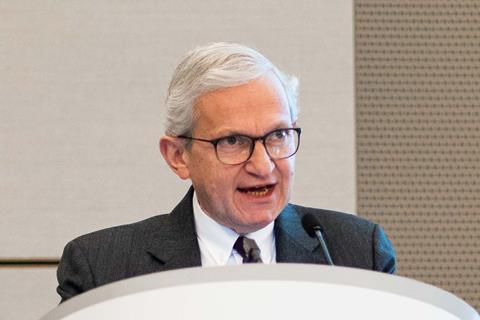Courts should not ‘reward incompetence by allowing long documents to be charged on the basis of hourly rate remuneration’, the master of the rolls has said.
Sir Geoffrey Vos warned that there has been ‘a reduced focus on active and effective case management in many areas of civil justice’ in recent years and called on judges to ‘resist prolixity’ from lawyers.
‘Long witness statements, unnecessarily complex experts' reports and the now often incredibly fleshy so-called “skeleton” arguments are in too many cases simply a vice,’ he said in a speech to the British Irish Commercial Bar Association published today.
‘Lawyers draft long documents, as the old saying goes, because they do not take the time to think hard enough about the case to draft short ones. It may be hard, but we should think carefully before rewarding incompetence by allowing long documents to be charged on the basis of hourly rate remuneration.’
He also said that ‘over-lengthy lists of issues are unacceptable’, adding: ‘There is no justification for trials that last weeks upon weeks because of a failure either of the lawyers or of the judge or of a combination of them to manage the case properly.’

Vos was critical of formal pleadings, which ‘have become far too long and are too often rambling and unfocused’, and suggested that they should be ‘reserved for the rare type of case that really needs them’.
‘Vast numbers of cases covered by CPR Part 8 have managed very well without pleadings for years,’ he said. ‘There is no reason why the default position should not change from pleadings to no pleadings.’
The master of the rolls added that ‘disclosure is still too much of a profit centre’, particularly in cases in the Business and Property Courts, despite the disclosure pilot which he said has ‘helpfully forced an early concentration on where disclosure is truly needed and where it is not’.
He called for ‘organic and incremental reform of a system that has become too expensive and governed by a set of rules that seems to grow, but never to shrink’. The disclosure pilot ‘provides a good blueprint’ for change. ‘There should be similar processes designed to deal with the excesses I have mentioned in respect of pleadings, experts reports and lists of issues, to name but a few, albeit important, parts of the existing CPR,’ he said.
Vos said there was a pressing need for ‘radical simplification’ of court procedure and suggested that ‘lessons need to be rapidly learned from the growing digital justice system’, which ‘does not need the detailed rules-based approach of an analogue system because the rules are hard-baked into the online platform itself’.
‘Make no mistake, this is indeed a revolution,’ he said. ‘But it is one that is, I think, long overdue. For too long, the legal system has neglected the interests of litigants in person, of vulnerable claimants and of those seeking quickly to vindicate small claims – all that has been sacrificed on the altar of historical concepts of what is fair and appropriate.
‘The received wisdom has been that every case, however small, is entitled to be litigated as if it were life-threatening or economically catastrophic for the parties. Proportionality is rightly the modern watchword.’
This article is now closed for comment.



























17 Readers' comments